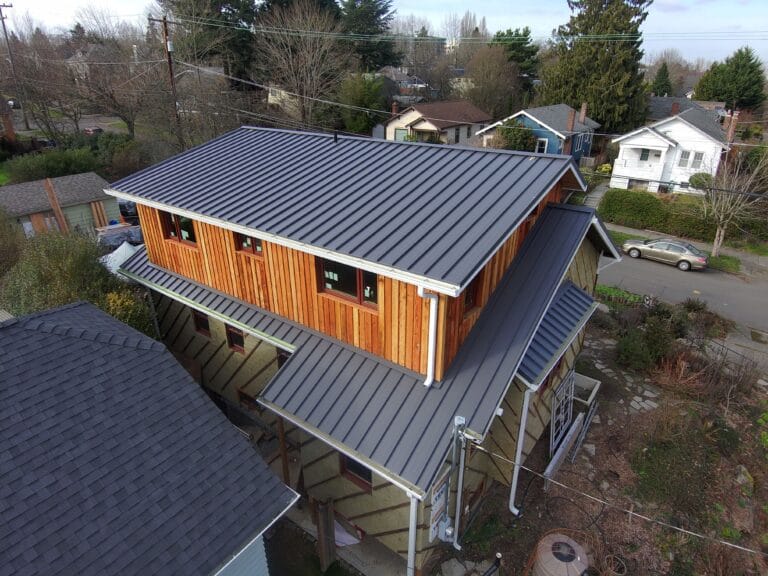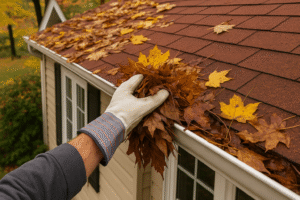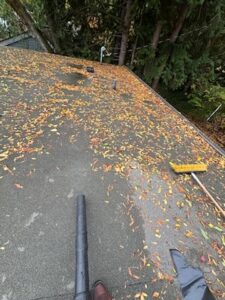Many homeowners ask, what type of roof do I have—especially when it’s time for repairs or a replacement. Knowing your roof style and the types of shingles it uses is essential for budgeting, selecting the right materials, and extending your roof’s life.
This guide explains common roof shapes, popular shingle materials, and how to tell what you’re working with so you can make informed decisions about maintenance and upgrades.
For more details on materials, visit:
Why Knowing Your Roof Type and Shingles Matters
Identifying your roof type and the shingles it uses helps with:
- Choosing proper replacement shingles
- Understanding asphalt shingle roof lifespans versus other materials
- Communicating clearly with contractors about roof slope and shingle style
- Planning maintenance specific to shingle roofing systems
Common Roof Styles Seen on Homes
Gable Roof
A classic shape with two sloping sides forming a peak. It often uses asphalt shingles because they shed water easily.
Hip Roof
Four slopes meet at a ridge, creating stability against wind. Hip roofs are often topped with architectural shingles for added curb appeal.
Flat Roof
Low-pitch designs common on modern homes. These may use membrane systems or, in some regions, modified bitumen shingles designed for flat surfaces.
Mansard and Gambrel Roofs
Multi‑sloped designs found on historic or custom homes, often featuring wood shingles or slate shingles for a distinctive look.
Popular Types of Shingles for Residential Roofs
Asphalt Shingles
The most common choice, asphalt shingles are cost‑effective, durable, and available in a variety of colors and profiles. They’re ideal for gable and hip roofs and are easy to replace.
Architectural Shingles
Also called dimensional or laminated shingles, these are a premium version of asphalt. Architectural shingles offer thicker layers, longer warranties, and a high‑end appearance.
Wood Shingles and Shakes
Wood shingles deliver a timeless, natural look. Cedar is popular, but wood requires more maintenance and isn’t suited for every climate.
Metal Shingles
Lightweight and long‑lasting, metal shingles mimic the appearance of traditional shingles while offering superior fire and wind resistance.
Slate and Composite Shingles
For luxury homes, slate shingles provide unmatched durability and elegance. Composite shingles replicate the look of wood or slate with lower maintenance.

How to Identify What Type of Roof and Shingles You Have
Observe Shape and Pitch
From the ground, note whether your roof is steep or flat, triangular or hipped. This helps narrow down the style.
Inspect the Shingle Texture and Color
Look closely at the surface. Do you see layered architectural shingles, smooth asphalt shingles, or natural wood shingles? Each has distinct texture and thickness.
Review Home Records or Ask an Inspector
Inspection reports often list roof type and material. If you’re unsure, a certified roof inspector can confirm whether you have asphalt, metal, or another shingle type.
Final Thoughts on Roof Types and Shingles
Understanding what type of roof you have—and the shingles installed on it—helps you make smarter choices about repairs, replacements, and upgrades. Whether you’re dealing with asphalt shingle roofing, wood shakes, or metal shingles, knowing your system’s strengths and limits protects your home and investment.
Ready to understand your roof and make confident decisions?
Identifying what type of roof you have—and the shingles that protect it—is the first step toward smarter maintenance and long‑lasting performance.
👉 Need expert guidance? Reach out to Orca Roofing for professional insights, detailed inspections, and recommendations tailored to your roof type and materials.


